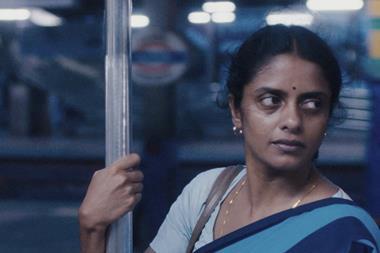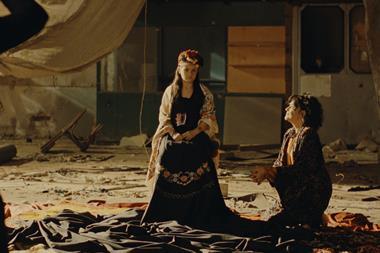A panel of regional filmmakers, programmers and distributors discussed Saudi Arabia’s emerging opportunities at a ScreenDaily Talk hosted in partnership with the Red Sea International Film Festival.
Watch the session above.
Moderated by Screen International’s senior Europe and Middle East correspondent Melanie Goodfellow, the panel included Red Sea International Film Festival (RSIFF) managing director Shivani Pandya Malhotra; Egyptian producer and head of Cairo-based production house Film Clinic Mohamed Hefzy; pioneering Saudi producer, filmmaker and screenwriter Mohammed Alhamoud; Saudi director and screenwriter Sara Mesfer; and Mohamed Al Hashemi country head of Majid Al Futtaim Leisure, Entertainment, Cinemas and Lifestyle in Saudi Arabia, who has spearheaded the launch of Vox Cinemas in the country.
As the first edition of the RSIFF enters its final weeks of preparation, Pandya Malhotra said that the stage was almost set for the festival, which is being held December 6-15 in the Red Sea port of Jeddah; a UNESCO heritage site that is being transformed for the event. “It’s important to showcase the history of Saudi Arabia,” she noted of the location.
While Saudi Arabia may have a rich history, its film industry is still in its infancy. The festival opens four short years after the Saudi Arabian Ministry of Culture lifted its 35-year ban on cinema-going, during which time both movie theatres and filmmaking has sprung up across the kingdom. “The reality is that there is real interest in developing the industry, and developing cultural understanding, which is the focus of the festival,” said Pandya Malhotra.
With Saudi Arabia being a traditionally conservative country, Pandya Malhotra said that the festival had to be “culturally sensitive” in its programming, but that all films were being shown uncut. They include 17 shorts and seven features from Saudi Arabia itself, something which she believes showcases the innovation and resilience of a young industry that has been impacted by the Covid-19 pandemic. “What [the industry] has achieved in the last few years is phenomenal,” she said. “I only see it getting better.”
That sense of optimism was shared by all of the panelists. Hefzy spoke about the “harmony” that already existed between Egypt’s Cairo Film Festival — of which he is president — and RSIFF, and the opportunities that Saudi Arabia can offer filmmakers in terms of co-productions and a new audience base for their films. “It’s a huge market that’s opening up,” he said, noting that while Saudi Arabia currently has no official co-production treaty, local companies are starting to collaborate with other Arab countries such as Egypt, Palestine and Jordan.
Al Hashem, who has opened 154 Vox Cinema screens in Saudi Arabia to date, commented on the huge audience appetite for both international and local content. The market, he said, is mostly influenced by international studio titles, although he noted that distributors must respect government decisions on certain titles. (Eternals, for example, is not allowed to screen in Saudi Arabia cinemas.) Yet local titles, such as the recent Masameer The Movie, which began life as a series of popular YouTube shorts before the cinema ban was lifted, can also do very well.
Training
Filmmakers Mesfer and Alhamoud, who both began studying and making films during the ban on cinemas, spoke about the passion for cinema and filmmaking that has long endured in the country, and the groundswell of talent that is now emerging. They hope that this new commitment to industry will only hope to increase creative opportunities.
“I want to see a more established industry so that we don’t need to worry about crews, funding, distribution,” said Mesfer. “We can then focus on telling the story rather than how to technically make it.”
Both Alhamoud, who studied filmmaking in San Francisco, and Hefzy pointed to the lack of technical crew in Saudi Arabia. All panelists agreed that education is key to this, and the country is taking steps in the right direction with the Ministry of Culture offering creative scholarships and myriad workshops organised by various organisations including the King Abdulaziz Centre For World Culture (Ithra). But more needs to be done. “To start an industry, you definitely need to have a film school,” said Alhamoud, who said he believes there will be one established within the next five years.
As Saudi Arabia’s industry continues to grow, and home-grown content finds a place on both local and international screens, do Saudi filmmakers feel any responsibility to educate audiences about their country? “I don’t think about anything other than the story,” asserted Mesfer. “That’s not our job,” agreed Alhamoud. “We just want to make films.”















![[L-R]: Amanda Villavieja, Laia Casanovas, Yasmina Praderas](https://d1nslcd7m2225b.cloudfront.net/Pictures/274x183/6/4/1/1471641_pxl_20251224_103354743_618426_crop.jpg)




















No comments yet